Free DJ Invoice Template Download for Professional Billing
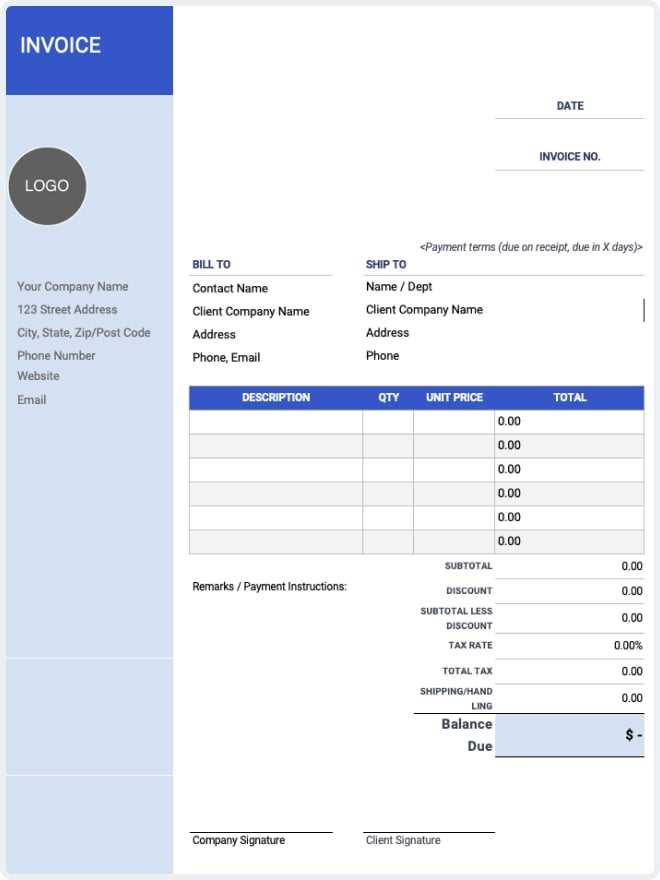
As a DJ, keeping your business organized is essential for long-term success. One of the most important aspects of managing your finances is ensuring you have a clear and professional way to request payments from clients. Having an efficient system in place for tracking your services and ensuring you’re paid accurately can save you time and effort while promoting a trustworthy image to your clients.
Creating a professional document for requesting payment allows you to set clear expectations with your customers. This document not only helps you organize your financial records but also reflects your professionalism. Whether you’re playing at a wedding, a club, or a private event, offering a structured and formal method of billing can make a significant difference in your business relationships.
In this guide, you’ll discover various resources to help you generate a polished and organized payment request. You’ll learn what information to include and how to tailor these documents to suit your specific needs. By the end, you’ll be ready to streamline your payment process and ensure timely compensation for all your performances.
Why You Need a DJ Invoice Template
When managing your DJ business, having a clear and professional way to request payment is essential. It helps ensure that you get paid on time and establishes trust with your clients. Without a structured approach, tracking payments and services becomes difficult, and misunderstandings may arise. A well-designed document makes your billing process smoother and more reliable for both you and your customers.
Here are some reasons why it’s crucial for DJs to use a standardized document for payment requests:
- Professionalism: A well-organized document enhances your professional image and shows clients that you take your work seriously.
- Clear Communication: You can clearly list services, prices, and terms, reducing the risk of confusion or disputes.
- Time-saving: Having a reusable format saves you the time spent creating documents from scratch for every event.
- Legal Protection: A formalized document serves as a record of your agreements and can protect you in case of payment disputes.
- Easy Tracking: A consistent format helps you track your payments and keep a detailed record of all transactions.
Using a ready-made structure not only simplifies your billing process but also ensures that every transaction is properly documented, leaving no room for mistakes. With all the necessary information in one place, you can maintain an organized and efficient business. It’s a tool that benefits both you and your clients by making the payment process c
How to Create a DJ Invoice from Scratch
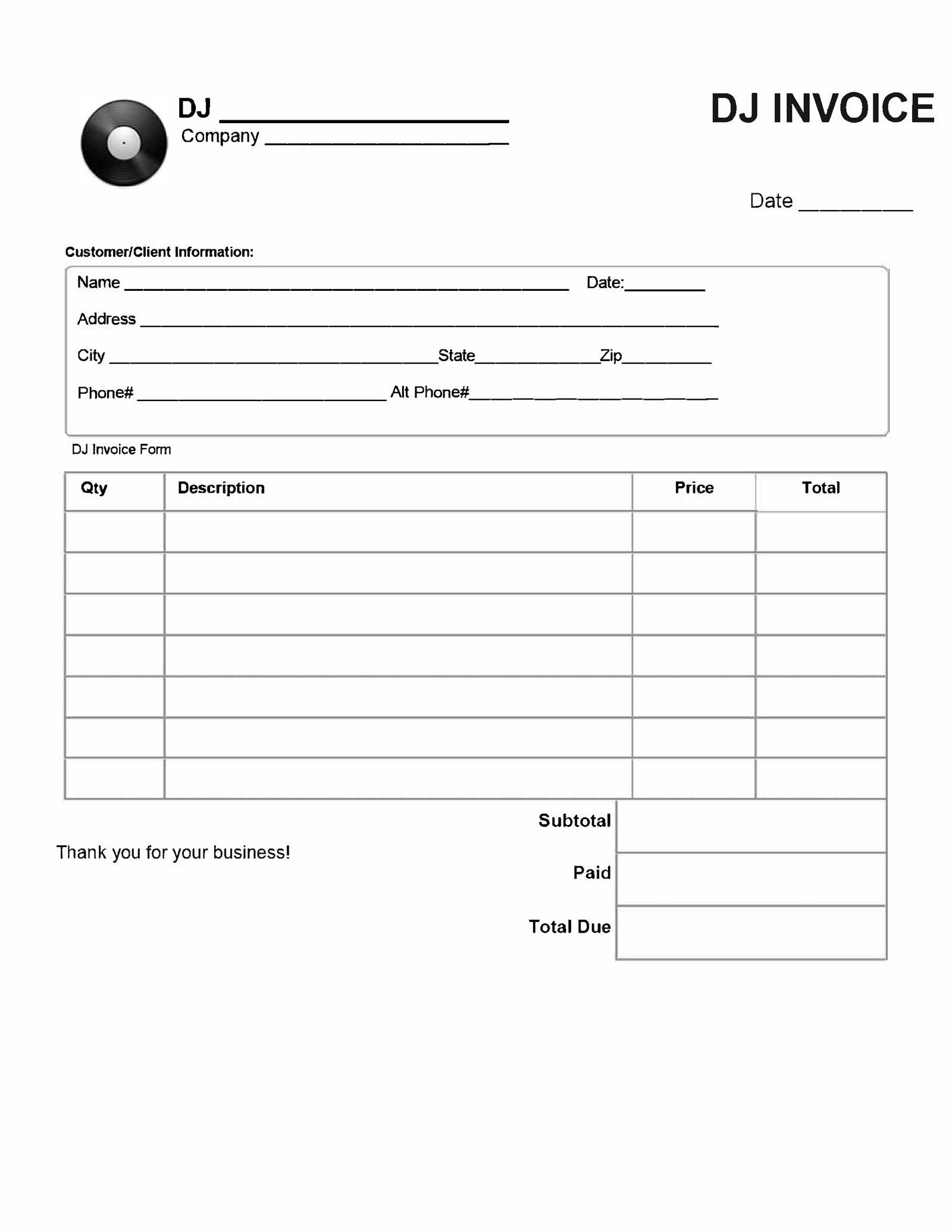
Creating a professional document to request payment for your services may seem like a daunting task, but it doesn’t have to be complicated. By organizing the key details of your performance, pricing, and terms, you can create a clear, concise, and effective document that ensures timely payment and minimizes confusion. Here’s a step-by-step guide to help you build your own from the ground up.
Follow these steps to craft a professional payment request:
- Include Your Contact Information: At the top of the document, provide your name, business name (if applicable), phone number, and email address. This makes it easy for clients to reach you if necessary.
- Client’s Information: Below your details, include the client’s name, company (if applicable), and contact information. This helps identify who the payment is for and adds a formal touch.
- Document Title: Title the document clearly, such as “Payment Request” or “Service Statement,” so the purpose of the document is immediately apparent.
- List of Services Provided: Clearly outline all services you provided during the event. Be as specific as possible to avoid misunderstandings. Include the date, hours worked, and any special equipment or services offered.
- Pricing Details: Break down the charges for each service. If you have hourly rates, list the number of hours worked. If you offer packages, provide the full price for each service rendered.
- Payment Terms: Specify when the payment is due, the accepted payment methods, and
Benefits of Using a Free DJ Invoice Template
Utilizing a pre-designed format for your payment requests can significantly streamline your business operations. Whether you’re new to the industry or an experienced DJ, having a structured document helps you stay organized, reduce errors, and maintain professionalism in all your transactions. Below are some of the key advantages of using a ready-made format for your billing needs.
Time-Saving and Convenience
- Quick Setup: You don’t need to start from scratch. Pre-designed documents already include all necessary fields, allowing you to focus on adding specific event details and payment information.
- Consistency: Reusing the same format for every client ensures a consistent presentation, saving you time on formatting and design each time.
- Efficiency: By eliminating the need to manually create a document from the ground up, you can quickly generate a professional request after each event, allowing you to focus on other important aspects of your business.
Professional Image and Accuracy
- Professional Appearance: A polished, well-structured document creates a positive impression, showing your clients that you are organized and reliable.
- Fewer Mistakes: When you rely on a predefined format, the chances of missing important details or making errors in calculations are reduced. This helps ensure your payment requests are clear and accurate.
- Clear Payment Terms: Pre-designed documents typically include sections for payment methods, deadlines, and late fees, making it easy to set clear expectations and avoid confusion with clients.
Incorporating a standard format into your billing
Key Elements in a DJ Payment Request
When creating a document to request payment for your services, it’s important to ensure that all relevant details are included. A well-structured document not only helps clarify your terms but also ensures transparency and minimizes the chances of misunderstandings. By incorporating specific elements, you make it easier for your clients to process payments and for you to stay organized. Below are the key components every payment request should have.
Essential Information
- Your Contact Details: At the top of the document, include your name or business name, phone number, email address, and any other relevant contact information. This ensures the client can easily reach you if needed.
- Client’s Information: List the client’s name, company name (if applicable), and contact details. This is vital for record-keeping and makes sure there is no confusion about who the payment is intended for.
- Document Title: Use a clear and recognizable title, such as “Payment Request” or “Service Statement,” so the purpose of the document is immediately understood.
Details of Services and Charges
- Services Rendered: Be specific about what you’ve provided. List the type of event (e.g., wedding, party, corporate event), the hours worked, and any special services or equipment used. This ensures transparency and avoids disputes over what was agreed upon.
- Rates and Fees: Clearly break down the pricing for each service. If you charge by the hour, list the number of hours worked and the corresponding rate. If you offer packages, detail what is included in each package and the total amount charged.
- Payment Terms: Clearly state when the payment is due, accepted payment methods, and any penalties for late payments. This helps manage client expectations and encourages timely payments.
By including these elements in your document, you ensure that both you and your clients are on the same page regarding expectations and financial terms. A detailed and accurate payment request not only makes the payment process smoother but also reflects professionalism in your business practices.
Top Websites for DJ Invoice Downloads
For DJs looking to streamline their billing process, there are several online platforms offering useful tools to create professional documents. These resources provide easy access to customizable forms that cater to the needs of performers in the music industry. By using these sites, DJs can ensure their financial transactions are clear, organized, and compliant with industry standards.
1. Wave Music Billing
Wave Music Billing offers a simple interface to create detailed financial documents for gigs and events. The platform allows customization of essential fields like event name, location, and payment terms, making it easy to adjust for each booking.
2. GigPay
GigPay is another go-to for DJs, providing a range of flexible options for setting up transaction summaries. It’s designed to simplify the process of tracking payments, including options for adding discounts or extra fees if necessary.
3. SoundDocs
SoundDocs specializes in providing organized forms for event professionals. DJs can easily access various formats that can be tailored to individual requirements, ensuring every transaction is clear and legally sound.
4. PerformDocs
PerformDocs allows DJs to generate formal documents that detail services rendered. The platform ensures that all necessary details are included, making it easy to maintain professionalism with clients and partners.
5. MusicPro Bills
MusicPro Bills is a versatile site that supports DJs in crafting professional documents for all types of engagements. With a variety of formats to choose from, DJs can easily personalize their forms to reflect their business style.
Customizing Your DJ Invoice Template
Tailoring your billing document to reflect your brand and specific needs is essential for maintaining professionalism and clarity. By adjusting various elements, you can ensure that all critical information is presented effectively and meets the expectations of your clients. Customization allows you to adapt the document for different types of events, payments, and agreements.
Personalize Your Branding
Start by incorporating your logo, business name, and contact details prominently at the top of the document. This not only strengthens your brand identity but also makes it easier for clients to get in touch with you for future bookings.
Adjust Payment Terms and Conditions
Each event may come with different payment structures. Customize the fields to specify whether the payment is upfront, after the event, or in installments. Clearly outline any late fees, cancellation policies, or discounts to avoid confusion.
Include Event-Specific Details
Be sure to list specific details related to the gig, such as the event date, location, performance duration, and any special requirements. This ensures that both you and the client are on the same page regarding the scope of work.
Custom Payment Methods
Different clients may prefer various payment methods. Add fields that allow you to specify accepted forms of payment, such as bank transfer, PayPal, or cash. Customizing this section helps avoid delays or misunderstandings in the transaction process.
How to Fill Out a DJ Invoice Correctly
Properly completing your billing document is crucial for ensuring that your business transactions are clear, professional, and legally sound. By following a few simple steps, you can make sure that all necessary information is included, avoiding any potential confusion with your clients. Below are the essential components that should be addressed when filling out this document.
1. Include Your Business Information
Start by filling out your contact information, which should be placed at the top of the document. This includes:
- Your full name or business name
- Phone number
- Email address
- Business address (if applicable)
2. Add Client’s Information
Make sure to input the client’s details accurately. This ensures that the document is personalized and properly linked to the correct party. Include:
- Client’s name or business name
- Contact number
- Email address
3. Specify Event Information
Clearly state the details of the event, as this section forms the foundation of your charges. Include:
- Event date and time
- Event location
- Services provided (e.g., DJ performance, equipment rental)
4. List Your Charges
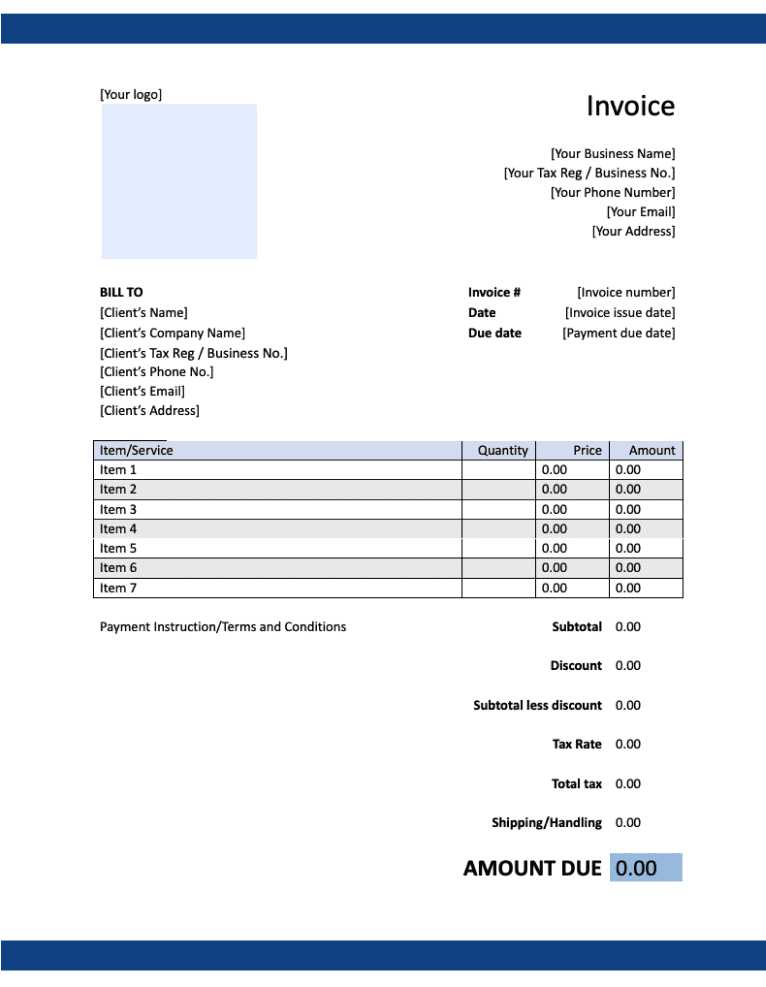
Break down the total amount due by specifying your rates for each service. If applicable, add:
- Hourly rate or flat fee
- Additional charges (e.g., equipment, travel expenses)
- Discounts or special offers
Best Practices for DJ Billing
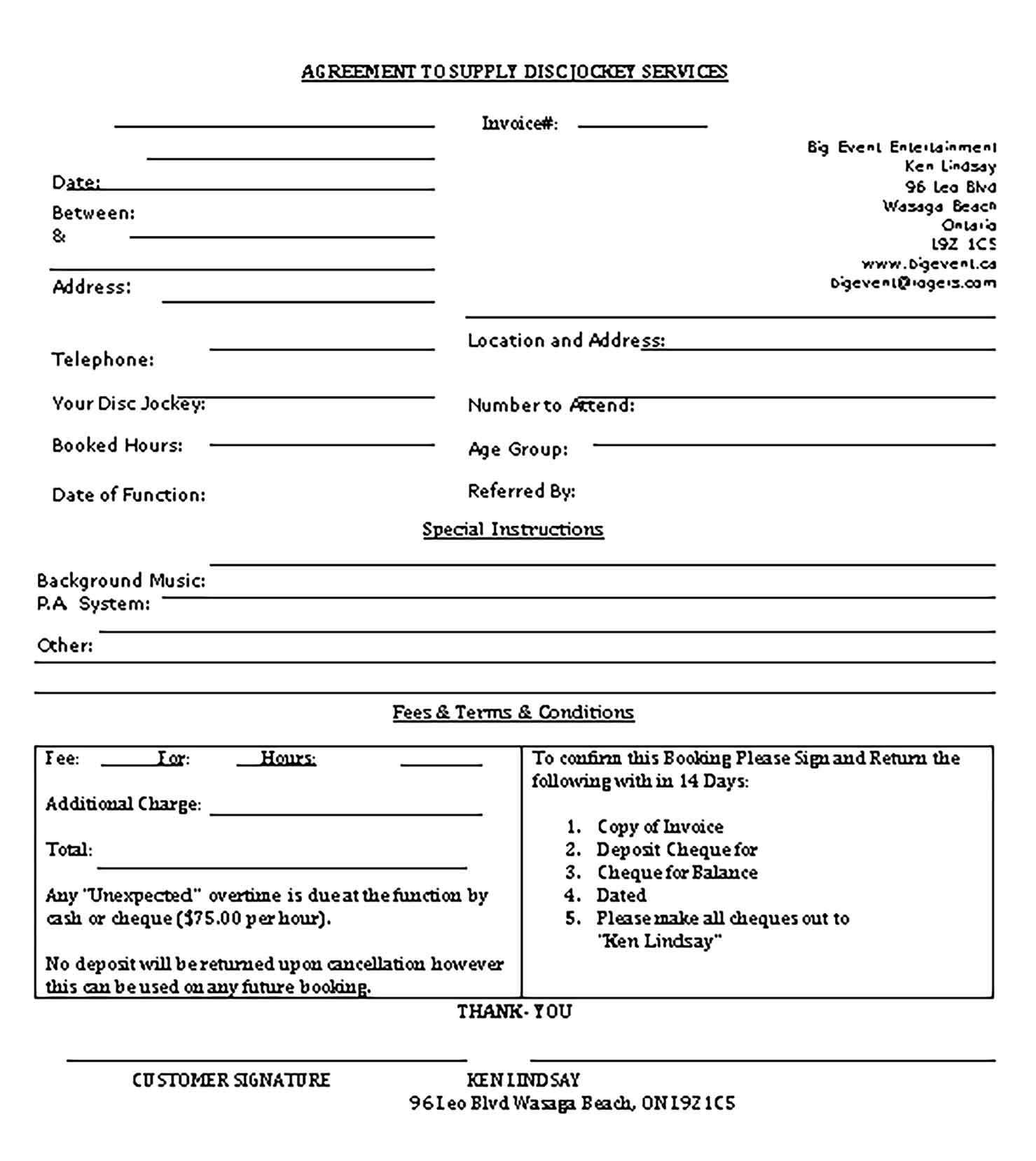
Managing financial transactions effectively is key to maintaining a professional image and ensuring that payments are received on time. By following some best practices, DJs can streamline their billing process, avoid misunderstandings with clients, and keep their business running smoothly. Below are some essential tips for handling payments and creating clear, transparent documents.
1. Be Clear and Transparent
Always provide a detailed breakdown of your services and charges. Clients should be able to understand exactly what they are paying for, including any additional fees for travel, equipment rental, or special requests. Transparency helps build trust and prevents disputes.
2. Set Payment Terms Upfront
Clearly outline your payment expectations before the event. Specify whether payment is due in advance, upon completion, or in installments. Setting clear terms helps manage expectations and ensures there are no surprises when it’s time to settle up.
3. Use Professional Documents
Always use well-organized documents that reflect your brand and professionalism. Whether you’re working with a physical or digital record, make sure it looks polished and includes all necessary details, such as event specifics, payment terms, and due dates.
4. Send Bills Promptly
Send your payment requests as soon as the event is completed or as per the agreed-upon schedule. Delaying the billing process can cause confusion and delay payments. Promptly submitting your documents encourages timely payment from clients.
5. Follow Up on Outstanding Payments
If a client hasn’t paid by the due date, send a polite reminder. Maintain a professional tone and offer flexible payment options if necessary. Following up shows that you take your business seriously and expect to be paid on time.
6.
How a Professional Invoice Builds Trust
Creating a well-organized and clear financial document not only helps you keep track of payments, but also establishes a sense of professionalism and reliability. Clients are more likely to trust you when they see that you handle financial transactions in a structured and transparent manner. A polished, thorough billing statement reflects your commitment to professionalism and creates a positive impression.
1. Clear Communication
When clients receive a detailed and easy-to-understand document, they are reassured that they are working with a professional. A well-laid-out statement ensures there is no ambiguity about the costs, payment terms, and services rendered, helping to prevent misunderstandings and establishing a strong foundation for trust.
2. Transparency and Accountability
By including all relevant information, such as service details, costs, and payment deadlines, you show clients that you are transparent in your business practices. This transparency reduces the chances of disputes and builds confidence, as clients can clearly see what they are paying for and why.
3. Shows Business Integrity
Sending a well-crafted document reflects your attention to detail and reinforces the idea that you take your business seriously. Clients appreciate working with vendors who operate with integrity, and a professional document reassures them that they are dealing with a trustworthy business.
4. Promotes Future Business
A polished financial statement also lays the groundwork for repeat business. When clients feel confident in how you handle transactions, they are more likely to return for future gigs or recommend your services to others. Trust is the cornerstone of long-term client relationships, and a professional document helps secure that trust.
Common Mistakes to Avoid in DJ Invoices
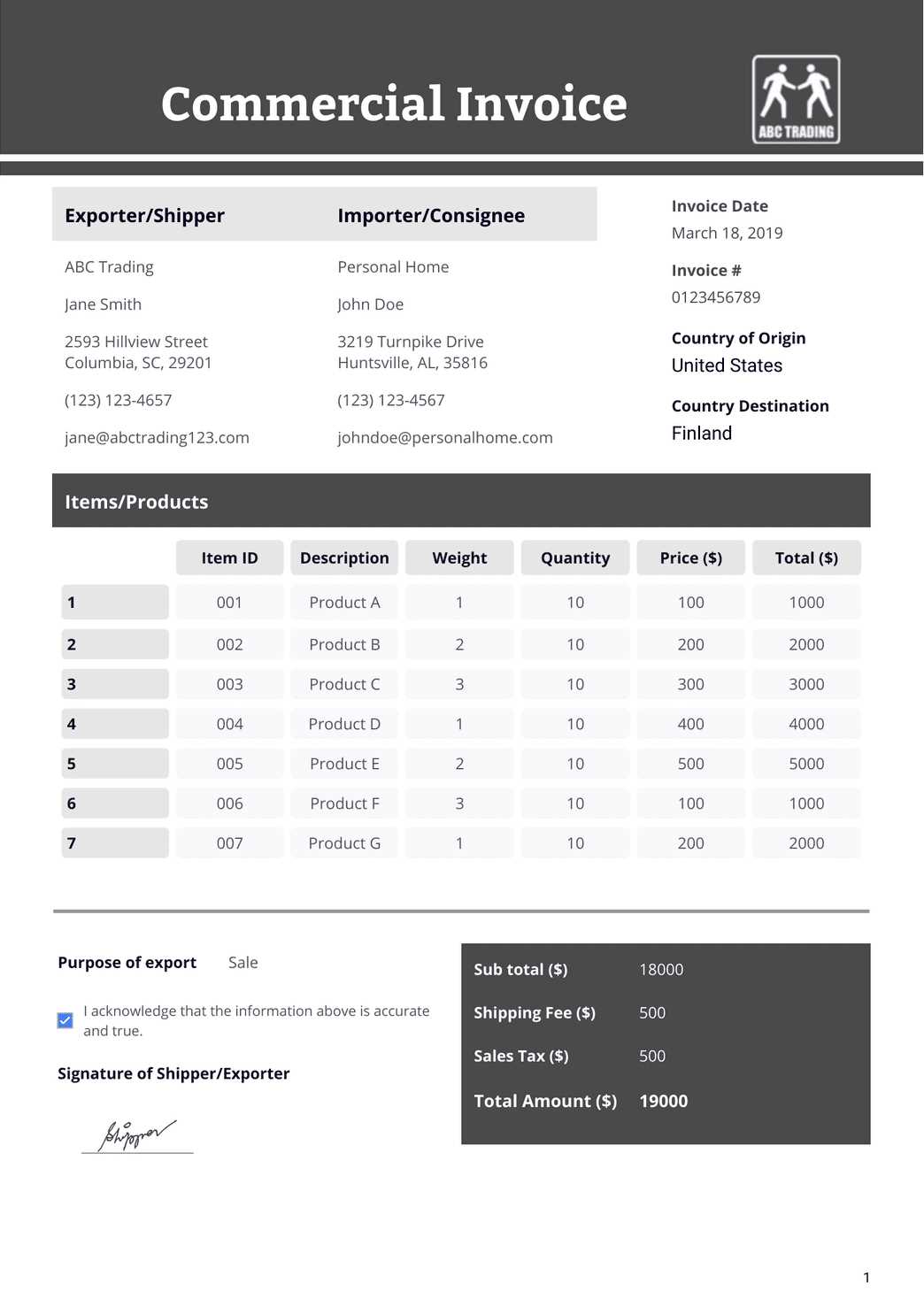
When it comes to billing for your DJ services, accuracy and clarity are key. Even small mistakes can lead to confusion, delays in payment, or a loss of client trust. Avoiding common pitfalls ensures that your financial records are professional, transparent, and easy to understand. Below are some of the most frequent errors DJs should avoid when creating their billing documents.
1. Missing or Incorrect Client Information
Always double-check the client’s name, contact details, and event information. Any errors in this section can lead to confusion, delays in communication, or even issues with payment. Make sure all details are accurate before finalizing the document.
2. Not Including All Services Provided
Ensure that every service you provided is listed clearly. Whether it’s equipment rental, travel expenses, or special requests, all additional charges should be itemized. Failing to include everything can result in undercharging or disputes later on.
3. Ambiguous Payment Terms
Never leave payment terms unclear. Be specific about the due date, accepted payment methods, and any penalties for late payments. Ambiguity in this section can lead to misunderstandings and missed payments, so make sure everything is explicitly stated.
4. Using Unprofessional Formatting
Presenting a disorganized or
Free vs Paid DJ Invoice Templates
When it comes to creating professional documents for your DJ services, there are both no-cost and paid options available. While free options can serve as a quick solution, paid alternatives often offer more advanced features and greater customization. Understanding the differences between the two can help you decide which is best suited for your business needs.
1. Advantages of No-Cost Options
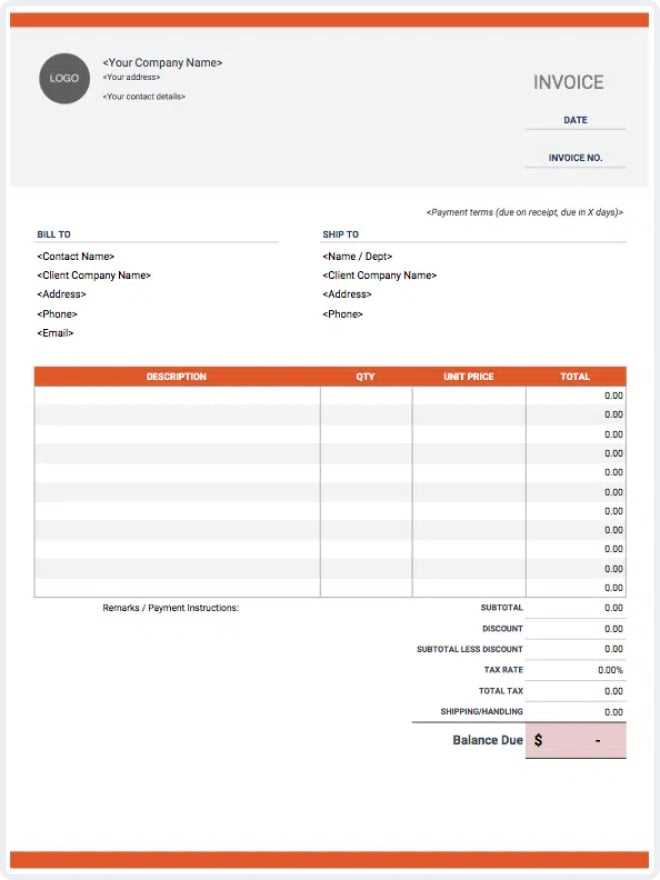
No-cost solutions can be a great starting point for DJs just getting started or those who have limited budgets. These documents typically provide basic functionality and can be quickly accessed. However, they may have limitations when it comes to design, customization, or advanced features. If you’re just looking for something simple to track payments and services, free tools can suffice.
2. Benefits of Paid Solutions
Paid options generally provide more flexibility, offering advanced features such as customized branding, automatic payment reminders, and more professional layouts. These tools may also come with customer support, ensuring you can get assistance if needed. Paid options are ideal for established DJs who require consistency, brand alignment, and a higher level of professionalism in their financial documentation.
3. Customization and Branding
Paid solutions often allow for more extensive customization, including the ability to add logos, change fonts, and adjust the layout to match your brand’s identity. With these features, your financial documents become a part of your overall brand presence, which can leave a positive impression on clients.
4. Time and Efficiency
While free tools may be suitable for occasional use, paid services tend to offer greater efficiency. Many paid options automate processes, such as calculating totals or applying discounts, which saves you time and minimizes the risk of errors.
How to Send DJ Invoices to Clients
Sending a payment request to your clients in a professional manner is essential for maintaining smooth business operations and ensuring timely payments. Whether you prefer digital or physical methods, the process should be straightforward and secure. Here’s how to efficiently deliver your billing documents to clients.
1. Choose the Right Delivery Method
There are several ways to send your payment request to clients. Consider the most convenient and professional method based on your client’s preferences:
- Email: Sending documents via email is fast and convenient. Most clients expect to receive digital documents, and it allows for easy tracking and record-keeping.
- Postal Mail: For clients who prefer physical copies, sending via postal mail can add a personal touch. Ensure that the document is printed clearly and securely packaged.
- Online Payment Platforms: Many DJ services now use online platforms that allow clients to view and pay directly. This method can simplify the process and speed up payment collection.
2. Ensure Proper Documentation Format
Regardless of how you send the document, ensure that it is in a format that is both easy to read and secure. Common options include:
- PDF: A PDF is universally accessible, preserves your formatting, and can’t be easily edited by the recipient.
- Word Document: While editable, a Word document is useful for clients who may need to make adjustments before payment.
3. Include All Relevant Details
Before sending, double-check that all necessary information is included to avoid confusion
Creating an Invoice for Different DJ Gigs
Each DJ event is unique, and so are the billing requirements for each one. Whether you’re performing at a private party, a wedding, or a corporate event, the details and complexity of your financial documents can vary based on the scope of the gig. Understanding how to tailor your financial statement for each type of performance will help ensure that all aspects of your service are covered, and payments are handled efficiently.
1. Basic Party or Club Gig
For a simple party or club gig, your billing may be straightforward, with minimal additional charges. Typically, the main focus will be on your performance time and any equipment you provided. A basic structure for this type of event might include:
Service Amount Performance Time (e.g., 4 hours) $500 Travel Fee $50 Total $550 2. Wedding or Special Event
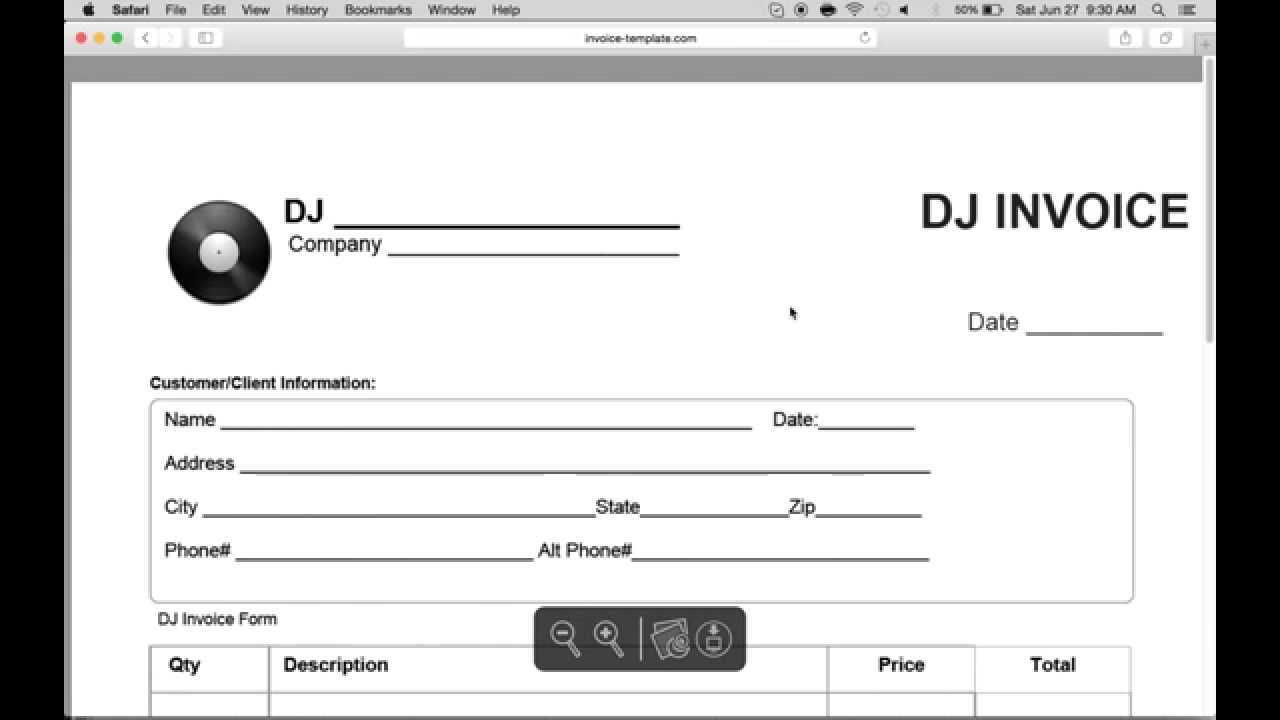
For weddings or more formal events, your financial statement may include additional details like sound system rentals, lighting equipment, or special requests. These events are often more elaborate and require more resources, so it’s
Invoice Templates for Mobile DJs
For mobile DJs, managing various events and clients requires efficient financial documentation. Whether you’re performing at weddings, corporate events, or private parties, creating clear and professional records is crucial for keeping track of payments and ensuring timely settlements. The right billing documents can help organize your services, list additional fees, and ensure that your clients know exactly what to expect.
1. Simple and Straightforward Documents
For small gigs or one-time events, your financial documents can be basic but still professional. A clear breakdown of performance time, any necessary equipment, and travel expenses should suffice. Keep it simple to avoid confusion, and always include payment terms such as due dates or deposit requirements.
2. Comprehensive Records for Larger Events
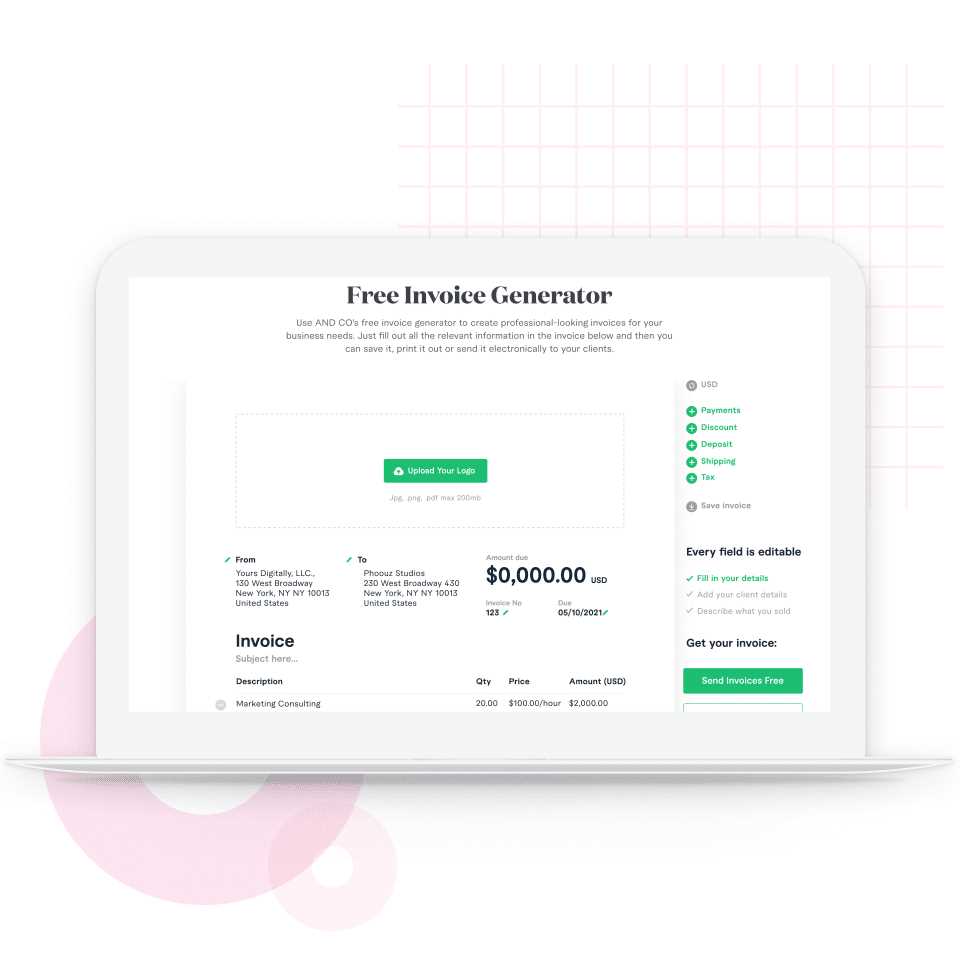
For more extensive bookings, like weddings or corporate events, your billing will likely include additional elements like sound system rentals, lighting, and other services. In these cases, a more detailed approach is necessary to ensure each component is accounted for. You can break down the charges into specific categories, allowing clients to see exactly what they are paying for.
How to Track Payments on Your Invoice
Keeping track of payments is essential for ensuring that all your services are compensated properly. For mobile DJs, this means having a clear system to record payments as they come in, manage overdue amounts, and update clients on the status of their balances. Properly tracking payments helps prevent misunderstandings and ensures your business stays financially organized.
One of the easiest ways to track payments is by incorporating a payment status section in your financial documents. This section can help both you and your clients stay on top of what has been paid and what is still owed. Below is an example of how you can structure this information:
Payment Description Amount Due Amount Paid Balance Remaining Payment Date Performance Fee $1000 $500 $500 01/15/2024 Travel Fee $100 $100 $0 01/15/2024 Total $1100 $600 $500 This table ensures that both you and the client have a clear understanding of the amount paid, the balance remaining, and when the payment was made. You can also add a column for notes or payment meth
What to Do After Sending a DJ Invoice
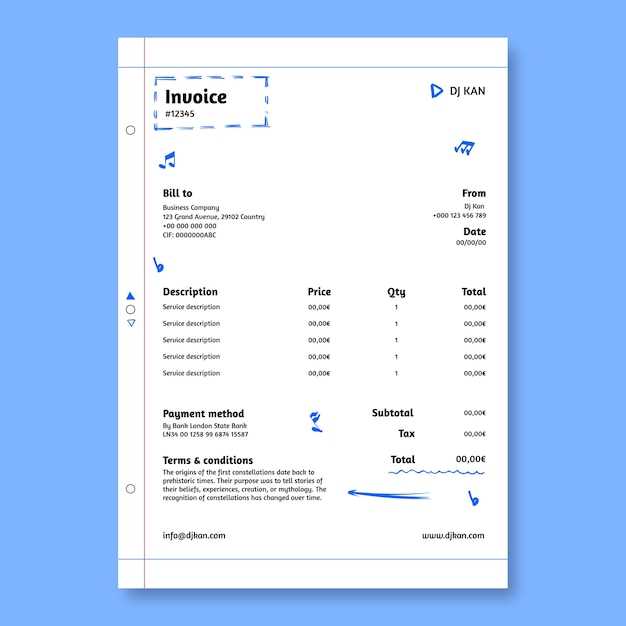
After you’ve sent your billing document to a client, there are several steps to follow to ensure you receive payment on time and keep your business organized. It’s important to maintain communication, track the payment status, and follow up if necessary. These actions will help you build a professional reputation and ensure smooth financial transactions for your services.
1. Confirm Receipt of the Document
Once you’ve sent the payment request, it’s a good idea to confirm with the client that they have received it. This can prevent any misunderstandings and ensure that the client is aware of the payment terms. Here’s how to do it:
- Send a brief email or message confirming that the document was sent and asking if they need any further information.
- Provide them with clear instructions on how to make the payment, if necessary.
2. Monitor the Payment Status
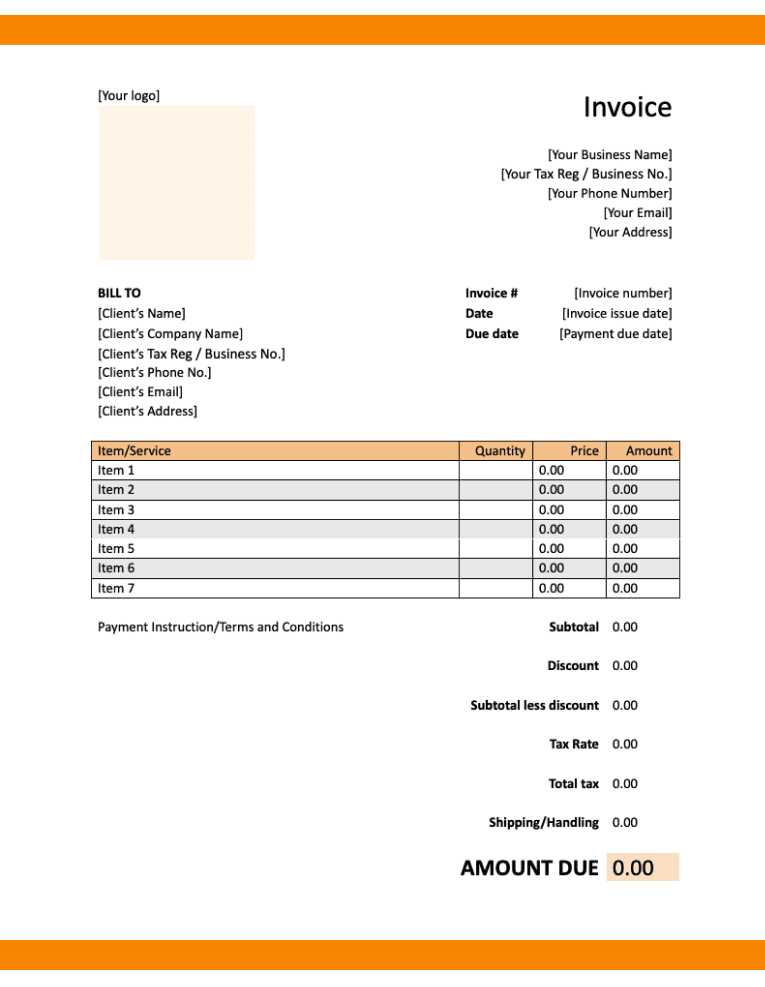
Keeping track of your payments is essential. Check your payment records regularly to see if the client has made the payment within the expected time frame. Here’s what to do:
- Review your payment tracking system to see if any balances are still outstanding.
- Check your bank or payment processing account for deposits matching the agreed-upon amount.
3. Send a Follow-Up Reminder
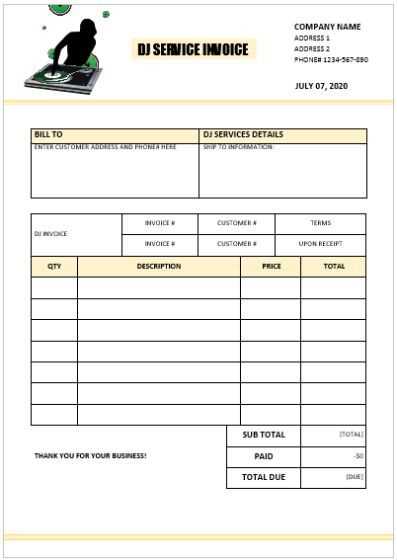
If the client hasn’t paid by the due date, it’s time to send a polite reminder. Here’s how to approach this:
- Be professional and courteous in your message, reminding the client of the payment due date and any applicable lat
Legal Considerations When Using DJ Invoices
When handling financial documentation for your DJ services, it’s important to ensure that everything is legally sound. Proper records not only help keep your business running smoothly but also protect you in case of disputes or legal issues. Understanding the essential legal elements that should be included in your billing documents can help you avoid potential problems with clients or tax authorities.
1. Clear Terms and Conditions
It’s crucial to outline clear terms in your billing records. This includes specifying the payment due dates, late fees, cancellation policies, and any additional costs related to travel or special services. A well-drafted document protects both you and your clients by setting expectations from the beginning. Key terms to include:
- Payment Deadlines: Clearly state when payment is due to avoid delays.
- Late Payment Fees: Set a fee for overdue payments to encourage timely settlement.
- Refunds and Cancellations: Outline the procedure and conditions for cancellations or refunds.
2. Tax Considerations
As a DJ, it’s important to understand how taxes apply to your services. Depending on your location, you may need to charge sales tax or other relevant taxes on your earnings. Including this information in your billing records is crucial to stay compliant with tax laws. Here are some things to keep in mind:
- Sales Tax: D